This Necklace Created by a Yale Grad & His Team Helps Kids in Rural India Get Vaccinated on Time
An innovative idea has turned the black thread worn by many newborn babies in Rajasthan into an effective tool to track and record their immunization details. It is called Khushi Baby and this is how it works.
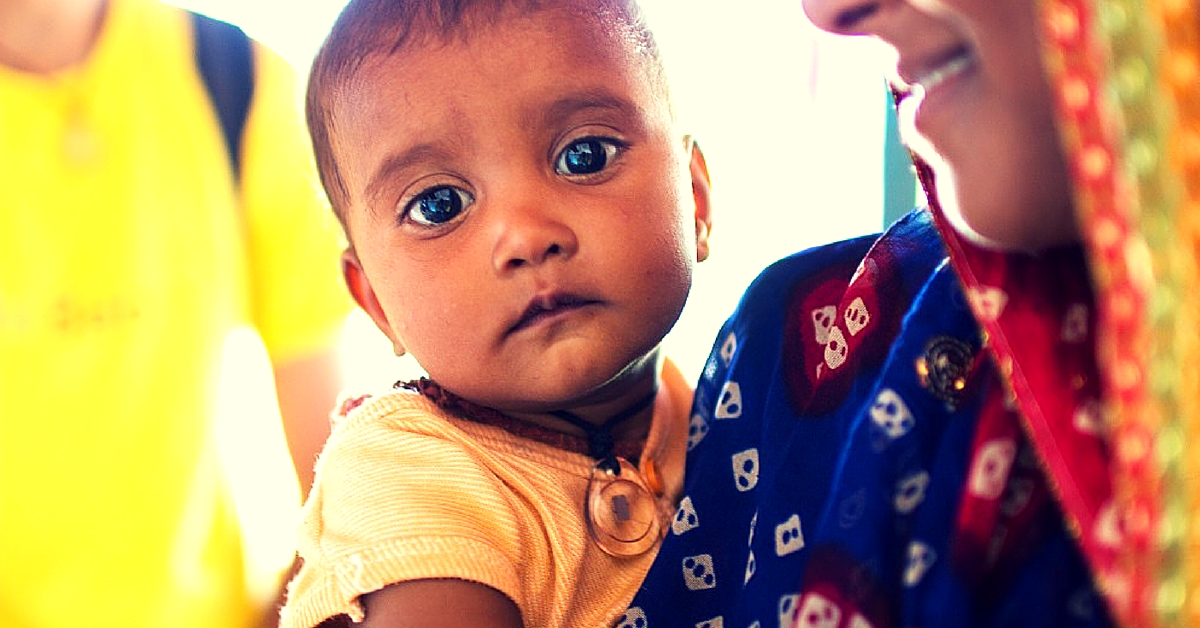
An innovative idea has turned the black thread worn by many newborn babies in Rajasthan into an effective tool to track and record their immunization details. It is called Khushi Baby and this is how it works.
Imagine an immunization camp in rural Rajasthan. A new mother walks in with her daughter who is not even a year old. She had come in for the previous immunization camp as well but, this time, she does not have the medical card she received three months ago. The card had her baby’s vaccination details but it is now lost. The health worker has no clue about the vaccines the child has or has not received. She has a standard Reproductive Child Health (RCH) register but finding relevant information in it is a cumbersome task. The child is now left with an uncertain health plan and helpless caretakers.
Vaccination gaps caused by data loss are a reality in many villages across India. The country has one of the lowest vaccination rates in the world, at under 60%, which is way below the 90% target set by WHO. Many mothers don’t understand the importance of vaccines and often forget about the camps.
It is to address this problem that Khushi Baby, a not-for-profit organization, came up with an innovative technology to track health data – the Khushi Baby necklace.
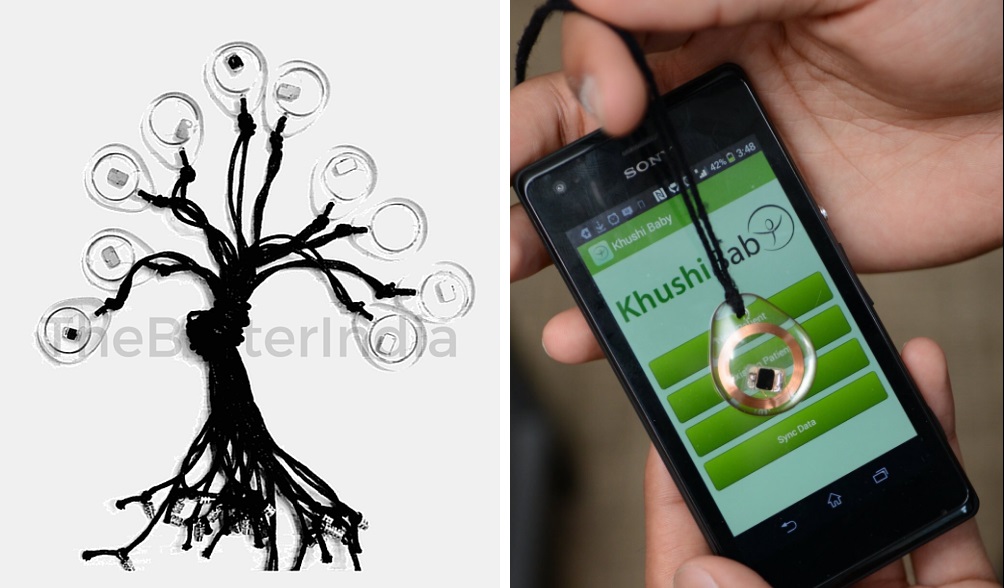
This technology is meant to record and track immunization data of newborn babies across the country by digitising the information at the point of care. The Khushi Baby (KB) system is a combination of a black thread, a waterproof plastic pendant with a near field communication (NFC) chip, and a mobile app.
You May Also Like: How One Man and His Team Brought about a Complete Ban on Gutka Sales in Odisha
The health worker or Auxiliary Nurse Midwife (ANM) assigns a new necklace to every baby on the first visit to a vaccination camp. She then uses an NFC-enabled smartphone or tablet with the KB app to scan the necklace and register the baby by entering details like name, father’s name, mother’s name, date of birth, etc. She also enters the details of the vaccines the child has received so far. The health worker scans the necklace once again after entering the details so that the updated data is available to the parents as well.
The same procedure is adopted at the next immunization camp where a health worker can scan the necklace and learn all about the child’s vaccination history with the help of the app. Currently, the app has Hindi and English language options.
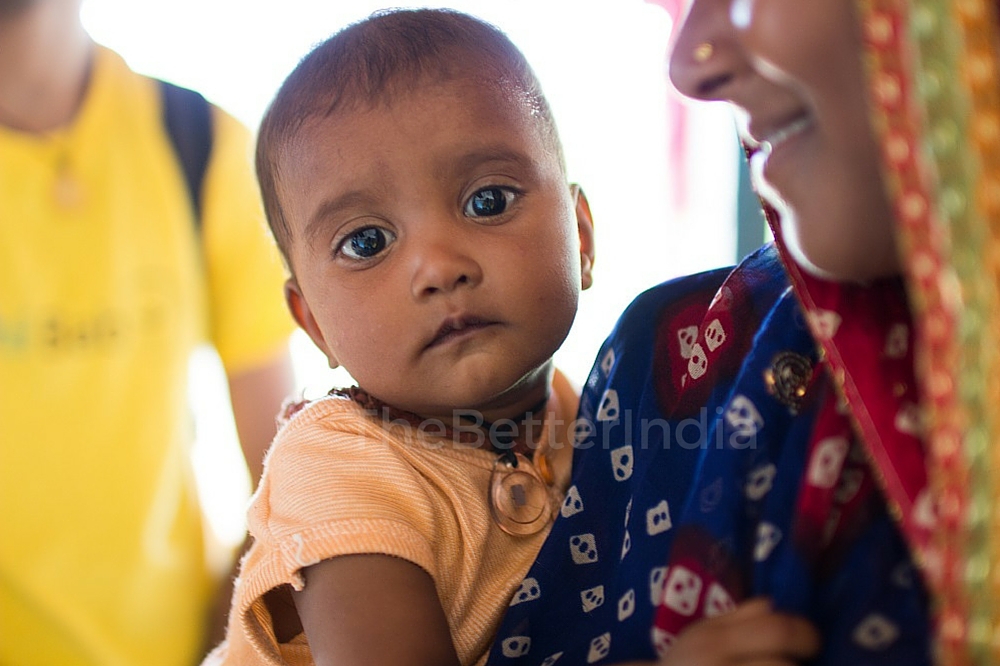
When the health workers go back to the block office or any place that has Internet connectivity, they upload the data on a cloud-based dashboard. The Ministry of Health and other health officials can use that data to generate reports, view patient-specific information, see which vaccines were not given and why, etc. This information can help them work on improving the system. The dashboard sends out voice calls to mothers’ cell phones too. These calls are in local dialects. They carry educational messages about different vaccines and their importance. The calls also remind mothers about the next vaccination camp.
The Khushi Baby project started in a classroom at Yale University. The founder, Ruchit Nagar, was part of a class focussed on creating new designs and technologies for the developing world to address the vaccination gap.
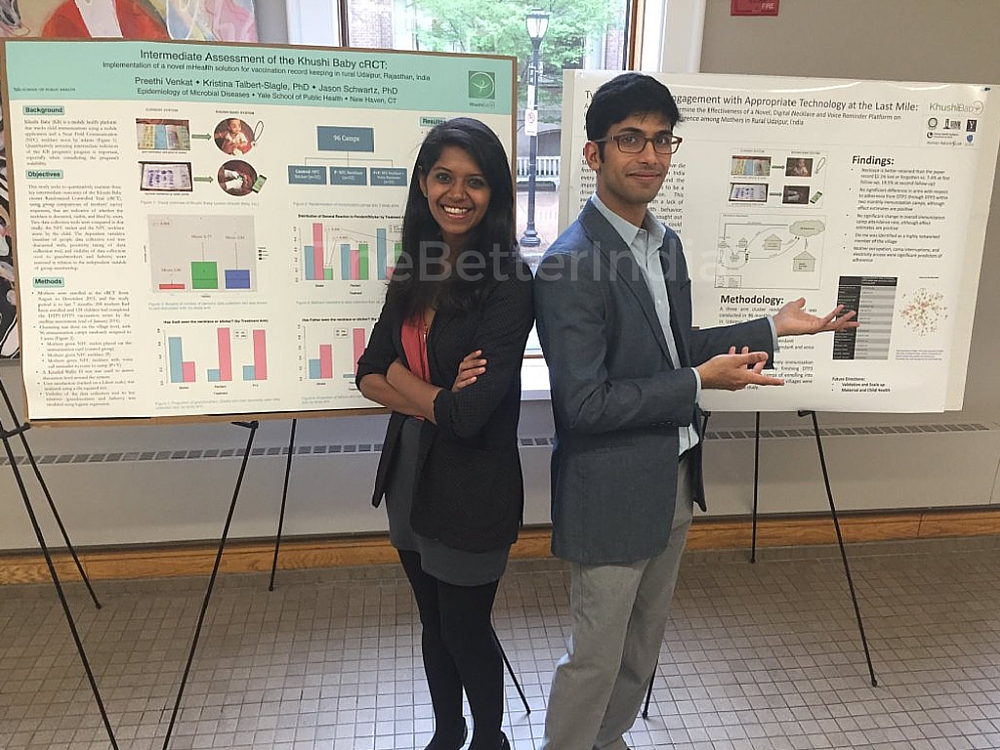
He and his team came up with some ideas and prototypes. In the summer of 2014, they joined hands with an NGO called Seva Mandir in Udaipur, Rajasthan. Seva Mandir organises vaccination camps in remote areas of the state and they were willing to help Ruchit’s team test their idea.
The team went to several villages in Rajasthan for field research and spoke to mothers, community members, nurses, etc.
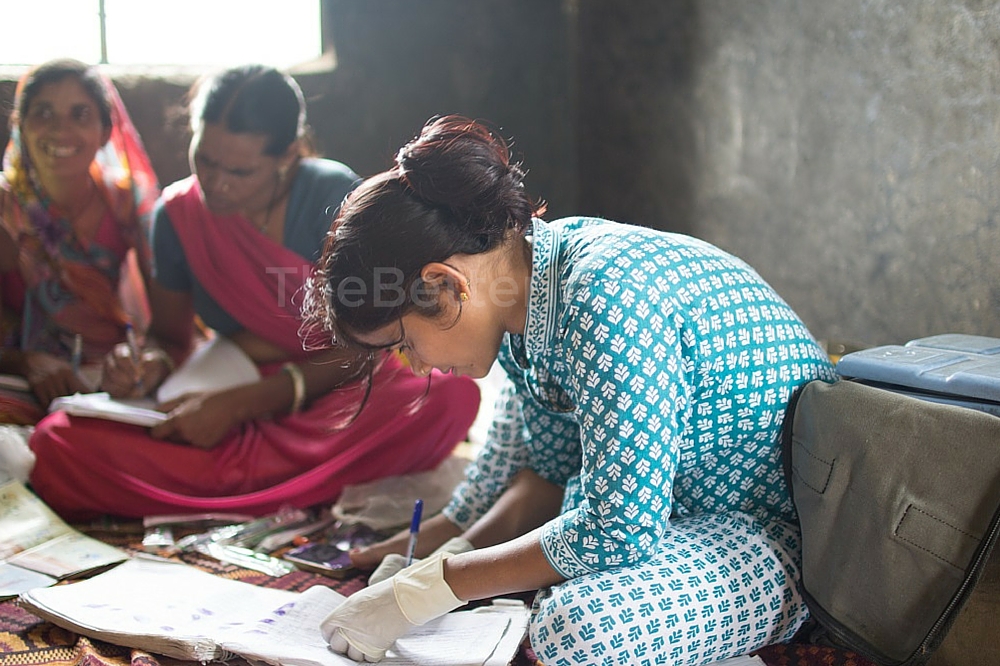
“We had an idea that we wanted to improve the way medical data is captured, but we didn’t know what form it would take. It was only after talking to people that we realised that a black thread or kala dhaga is put around the neck of many children in that region. So we thought of using it for a larger purpose,” says Ruchit.
People in many parts of India believe that the black thread protects children from the evil eye. In this way, the idea of Khushi Baby turned out to be a natural fit with the traditions and customs of the people.
The team has just finished one of the trials for the necklace in Udaipur, with a small group of 214 women. Additionally, they have rolled out the Khushi Baby system to 96 camps in northern India.
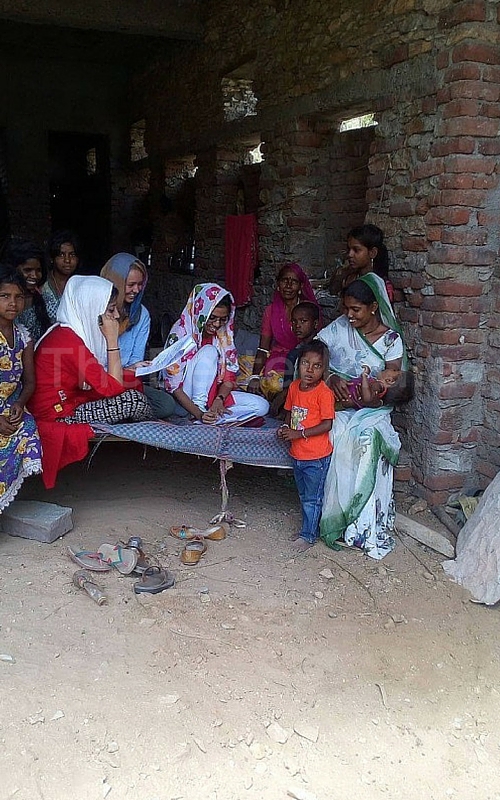
Over 1,500 babies are already registered in the system. They are now planning to extend the idea to pregnant women who can use the necklace as well to track antenatal health check-ups, vaccines they have received or need to receive during pregnancy, etc. They will work with the district government of Udaipur for the next trial.
“All ANMs have an RCH register as a part of the national rural health mission. Health workers fill in over 120 columns of data in the registers each day. We are trying to collect all that data and store it on the chip,” says Ruchit, who just finished his public health degree from Yale University.
The necklaces are given to the babies for free. The manufacturing cost is Rs. 50 as of now and will come down to Rs. 35 to Rs. 40 soon. Ruchit says the government is planning to provide tablets to all ANMs and health workers, which would be beneficial for this technology. “We are trying to build for the future that is coming soon,” he adds.
You May Also Like: How a Tiny Bracelet Can Save Millions of Newborn Babies Every Year in India
The core team at Khushi Baby includes Preethi Venkat who joined Ruchit at Yale itself and Mohammed Shahnawaz, who they met in India.
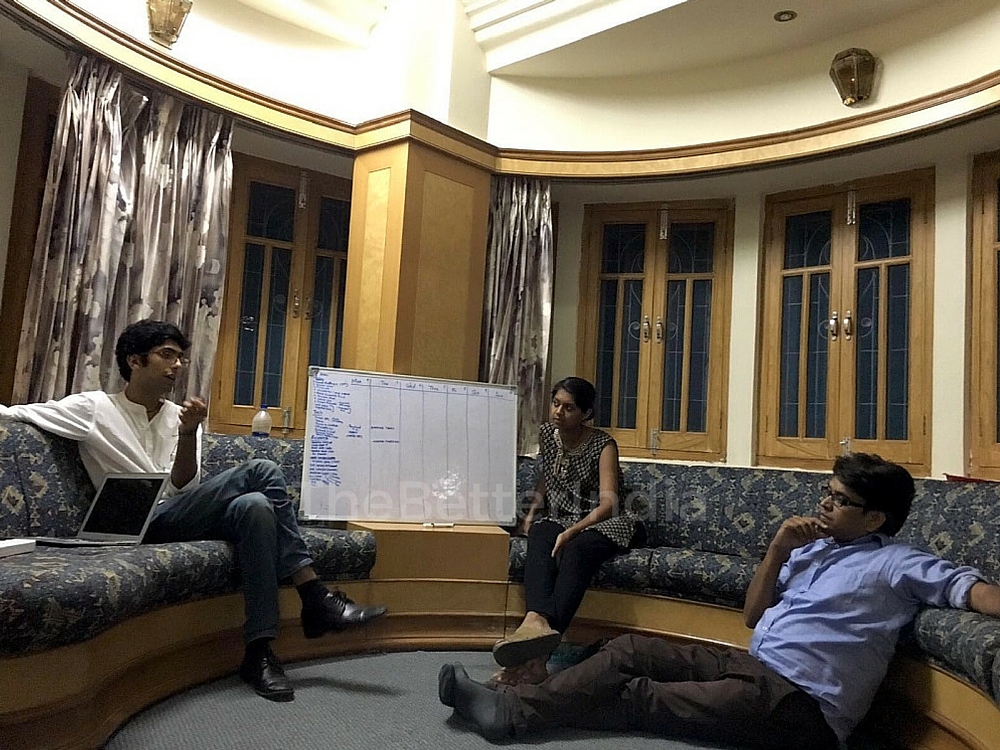
They have an extended team of 20 members and 10 interns from different countries. Organizations like UNICEF, Andela, Seva Mandir, Yale School of Public Health, IIHMR University Jaipur, Future Health Systems group, etc., fund and support their work. Additionally, they have won several grants to help them with finances.
“At the end of our first trial we found that 11 % of the 214 women lost the paper health cards in three months. We also found that the necklace was likely to be retained five times more and it was well adopted,” says Ruchit.
Districts from Haryana, Assam and Bengal have expressed interest in this technology and the team hopes to expand to as many cities as possible. The organization is not tied to the necklace design and is prepared to adapt the product as per the needs of local populations.
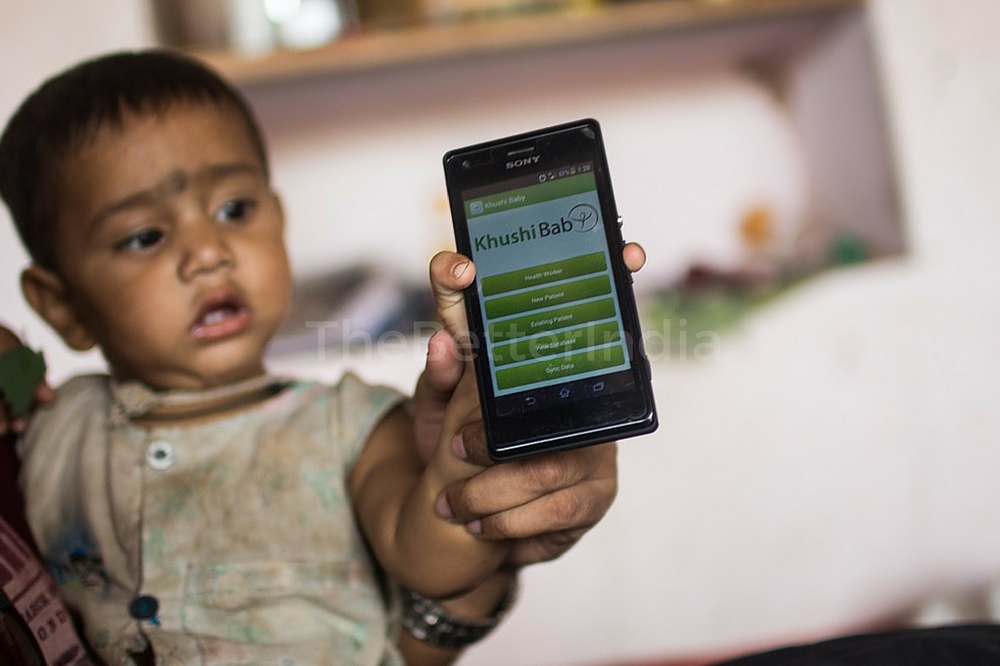
“Five lakh children under the age of five die from vaccine-preventable diseases every year in India. Even in the small sample size that we were working with, we came to know about three infant deaths. The numbers open your eyes because you come to realise this is such a huge problem and so much work needs to be done in the field. We are trying to create value and empower people doing the ground work. We want to give them the right tools to ensure that no child and mother are left behind,” concludes Ruchit.
You May Also Like: This Cord Bank Could Save More Than 70% of Children Suffering from Blood Cancer in India
You can contact the team by writing to them at [email protected].
Like this story? Have something to share? Email: [email protected], or join us on Facebook and Twitter (@thebetterindia). To get positive news on WhatsApp, just send ‘Start’ to 090 2900 3600 via WhatsApp.
If you found our stories insightful, informative, or even just enjoyable, we invite you to consider making a voluntary payment to support the work we do at The Better India. Your contribution helps us continue producing quality content that educates, inspires, and drives positive change.
Choose one of the payment options below for your contribution-
By paying for the stories you value, you directly contribute to sustaining our efforts focused on making a difference in the world. Together, let’s ensure that impactful stories continue to be told and shared, enriching lives and communities alike.
Thank you for your support. Here are some frequently asked questions you might find helpful to know why you are contributing?


This story made me
-
97
-
121
-
89
-
167













